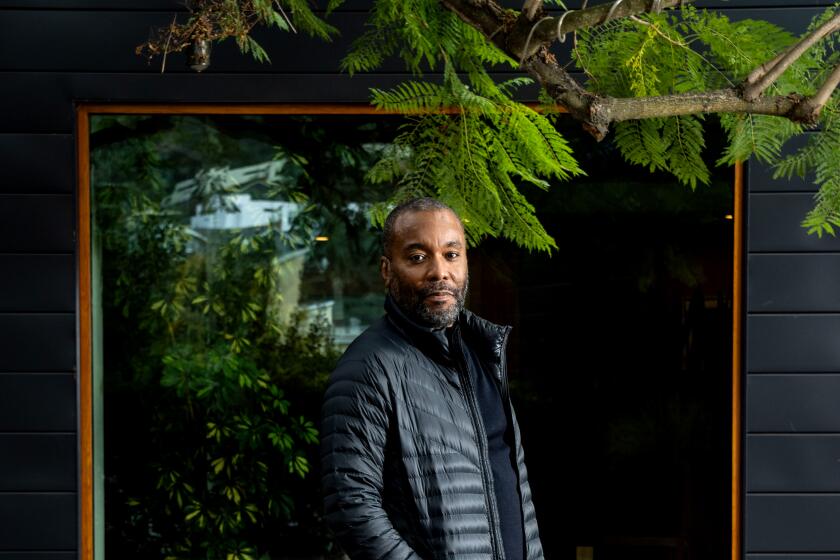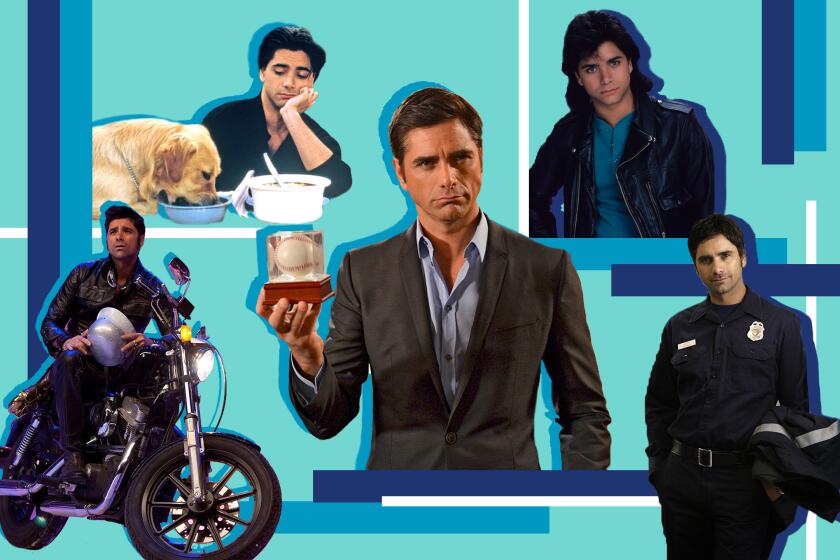‘The Wonder Years’ and ‘Doogie Kamealoha, M.D.’ show exactly what TV reboots are for
- Share via
If we accept that there is nothing new under the sun, we may at least applaud for their honesty two new comedies that make no secret of their antecedents, which in each case reach back to the turn of the 1990s. (We can applaud them for more, and will.)
Wednesday sees the premiere on ABC of “The Wonder Years,” producer Lee Daniels’ Black reboot, developed by Saladin K. Patterson, of the bittersweet memoir of suburban life in the late ’60s and early ’70s. Earlier this month, ABC’s corporate cousin Disney+ debuted “Doogie Kamealoha, M.D.,” a gender-flipped remake of “Doogie Howser, M.D.,” also originally on ABC, about a teenage doctor dealing with adolescence and life and death.
The complete guide to home viewing
Get Screen Gab for everything about the TV shows and streaming movies everyone’s talking about.
You may occasionally receive promotional content from the Los Angeles Times.
One might point a finger at such retreads as evidence of a lazy Hollywood, but given the age we live in of franchises, reboots and sequels separated sometimes by decades, Hollywood is clearly good with that. At the same time, one wonders how much these brands really mean to contemporary audiences; the originals are there in their entirety, both on Hulu, should the older generations care to relive or share them, but the new versions will be as good as original to younger generations. I mean, there are people who think that Batman is Ben Affleck and not Adam West. (And people who think Batman is Adam West and not Lewis Wilson.) Time is a river.
The Oscar nominee and “Empire” co-creator has never been afraid to make waves. And with three fall shows, he’s not slowing down anytime soon.
Besides whatever pre-launch interest they may generate, such naming does excuse these programs from charges of plagiarism: We know they’re the same. Indeed, the pilot episodes of “Doogie Kamealoha” and “Doogie Howser” have look-alike plots — driving test leads to crash scene, 16th birthday a bust, Doogie gets close to heart patient (guest star Barry Bostwick), first dance, other things — and much repurposed dialogue. But in fact, changing the terms of the formula does give a different result. Watching those first episodes of the original series, each more than 30 years old, one is struck by their … quaintness, how surprisingly old-fashioned they can seem. And why would one even bother to remake them with white male leads? The aims and ideals of these shows are (mostly) in the spirit of their models, but the light hits them from a different angle.
The new “The Wonder Years,” which has moved from the Anysuburb of the original to the specific Montgomery, Ala., also begins in 1968, the year of assassinations; without making too much a point of it — obvious, but not too obvious — it’s more political than its predecessor, both explicitly and implicitly. (I am judging only by the pilot, directed by original “Wonder Years” kid Fred Savage, which is all that was made available for review.) These are the first words spoken in the series, by narrator Don Cheadle, as the adult version of protagonist Dean Williams (Elisha Williams, not a bad physical match for someone who might grow up to be Cheadle): “Growing up, Mom and Dad gave me the police talk about how to handle yourself around cops.”
The show suggests some of the relationships of the originals without copying them. Dean, like his predecessor Kevin Arnold, is just turning 12, wondering who he is and how he fits in. Father Bill (Dulé Hill, easing into his paternal years) is a music professor and funk musician; lively mother Lillian (Saycon Sengbloh) is an accountant; older sister Kim (Laura Kariuki) is the rebel, smelling revolution in the air; and an older brother is offstage in Vietnam. “I’d never be as popular as my sister, or as athletic as my brother, as smart as my mom, or as bad as my dad,” says Dean in his grown-up Cheadle voice.
Although he is far from cool, Dean has, as he must, his posse: Cory (Amari O’Neil) and Brad (Julian Lerner), who is pointedly shown using a drinking fountain after Dean, where some textbook white kids do not. Brad is Jewish, like Kevin Arnold’s friend Paul, and in both contexts an exotic. (Cory and Brad more or less make up a Paul between them.) Milan Ray plays Keisa, the Winnie Cooper of the piece. All the young actors, and all the older actors, are well cast and excellent.
It has been widely noted that a Black “Wonder Years” was already mounted in the form of “Everybody Hates Chris,” the 2005 series loosely based on Chris Rock’s 1980s Brooklyn childhood, in which, as in both versions of “The Wonder Years,” Rock narrates from the future, though to a more comical, caustic effect. (An animated reboot of “Chris” is reportedly in the works.) That formal resemblance aside, the Daniels/Patterson “Wonder Years” is much more in the spirit of the original, set in the same time, in a neighborhood of single-family homes, “just as safe as the ones that were developing outside the city” — that is, the suburbs.
“There were teachers, veterans, shop owners, all united by pride, self-determination and the right to spank any kid caught outside after the streetlights came on.” Niceties of age aside, it has a boomer soul. (Daniels is 61, just under the wire; showrunner Patterson, who was born in 1972 and grew up in Montgomery, is Generation X but has a sitcom career that runs back past “Frasier” to “The PJs” and “Teen Angel.”)
In the Hawaii-set “Doogie Kamealoha, M.D.” developed by Kourtney Kang (“Fresh Off the Boat”), the main character, whose name is Lahela, is called “Doogie” by her colleagues as a joke, because “she’s like a real-life Doogie Howser.” Peyton Elizabeth Lee, who starred in the Disney Channel’s middle-school comedy “Andi Mack,” plays her. As was Doogie’s father, Lahela’s mother (Kathleen Rose Perkins as Clara) is her boss and also the boss of her. (“I love you … doctor,” she calls as Lahela runs down the hall after a brief disagreement.) Father Benny (Jason Scott Lee) “used to work in finance but I wanted more out of life”; now he runs a combination shave ice and florist truck, spears dinner and heads into the ocean whenever he likes.
And where Doogie Howser was an only child, Lahela gets an older brother (Matthew Sato as Kai), a surfing hottie of statistically average intelligence, and a younger brother (Wes Tian as Brian), obsessed with his oncoming but yet to arrive puberty. Brian has a crush on Lahela’s goofy best friend (Emma Meisel as Steph), who has a crush on Kai. (“The plot thickens in this love triangle of ours,” he mutters as Steph throws herself once again into Kai’s field of vision. He’s funny.) The Kamealohas all live in a nice little house on the beautiful water.
With “Big Shot,” on Disney+, the “Full House” veteran has found the perfect part in a lovely show. Perhaps the Stamossance is already here.
Steph typically arrives through Lahela’s window, as in “Doogie Howser” (and “Clarissa Explains It All for You” and “Dawson’s Creek”; it’s a trope). Their scenes together are the closest “Doogie Kamealoha” runs to typical Disney tween-com style; they bring out the ham in each other. But from the scant evidence of two episodes, the new “Doogie” seems to be less about learning life lessons — Neil Patrick Harris was generally quiet and serious in the original — than in scampering comedy and moony romance. (One would say it has been made less for old broadcast TV’s all-age audience, than for a younger niche in a streaming age.) There is a certain glibness, too, as when Lahela compares a patient’s sudden loss of movement in his legs to her getting an indecipherable emoji from the person she was making out with the night before.
We shall see. The second episode surrenders a little too much to implausibility, possibly not the best strategy when your basic premise is already an extraordinary one; for generations raised on superheroes, perhaps, the merely extraordinary is just too ordinary. It’s mostly little things, but out of key with the more down-to-earth pilot. In order to determine whether a boy (Alex Aiono as Walter) likes her, Lahela as good as instantly prepares a PowerPoint presentation including DNA analysis, body language analysis and caterpillar emoji analysis; in order to crack a tough case, she goes through several thousand hard-copy reports in a night (“I’m just a fast reader,” she says when a colleague admires her “computer” brain); and in order to create a romantic atmosphere for Lahela and Walter, Steph whips up a beachside oasis of lights and pillows and a man playing the ukulele. “Don’t worry,” says Steph, “I dragged away that dead shark; I can’t do anything about the smell.”
It would be a shame to make that the thrust of the show. The new “Doogie” does demonstrate the capacity for feeling — the scenes between mother and daughter are especially good, even the lighter ones, and terribly moving when crisis hits. Perkins is a highlight of Disney+’s “Big Shot,” and Lee, who is being asked to carry what feels like at least a couple of sitcoms in one, can summon wells of feeling when she’s asked. But, as ever, it isn’t my call.
‘Doogie Kamealoha, M.D.’
Where: Disney+
When: Anytime
Rated: TV-PG (may be unsuitable for young children)
‘The Wonder Years’
Where: ABC
When: 8:30 p.m. Wednesday
Rated: TV-PG-L (may be unsuitable for young children with an advisory for coarse language)
More to Read
The complete guide to home viewing
Get Screen Gab for everything about the TV shows and streaming movies everyone’s talking about.
You may occasionally receive promotional content from the Los Angeles Times.









